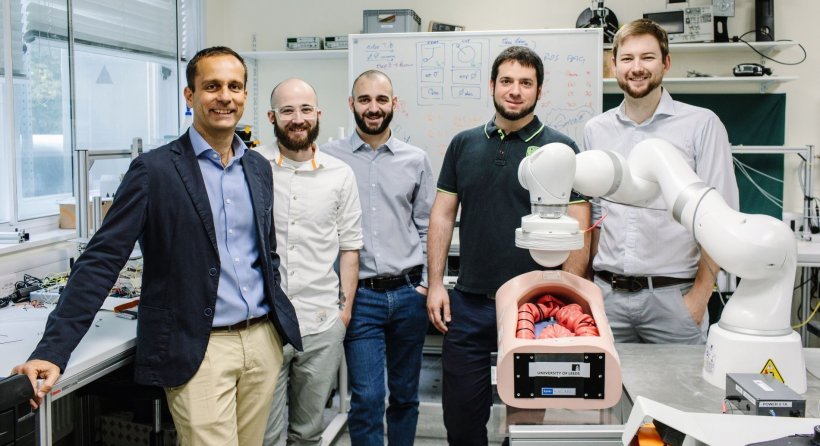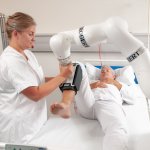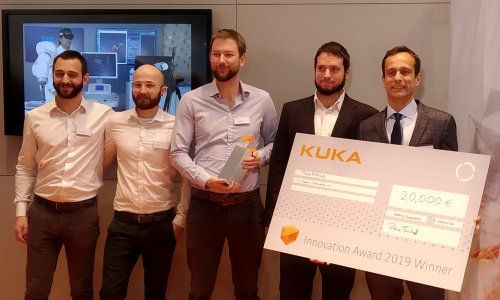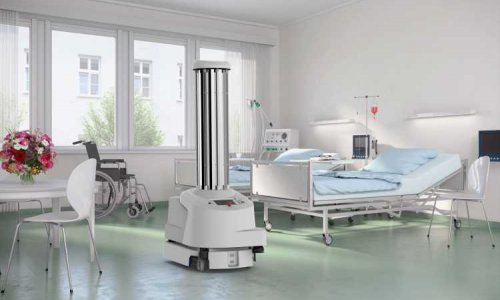
Sponsored • KUKA Innovation Award
Five Healthy Living finalists selected
Augsburg, Bavaria – Five teams of robotics specialists are finalists in the KUKA Innovation Award 2019 competition. Established in 2014, the Award focuses on medical robotics for the first time, Dr Rainer Bischoff, Vice President Corporate Research at KUKA, one of the judges of the award, explained.
Around thirty talented robotics teams from all over the world submitted their concepts and an international expert jury chose the best five teams. Each finalist team received a sensitive KUKA lightweight robot LBR Med and 3D vision sensor from Roboception, free of charge, and also a coaching by the company’s experts throughout the time of the competition.
This year, for the first time, the Kuka LBR Med – the medical version of the sensitive lightweight robot – is used in the finals. The LBR Med is the world’s first robotic component certified for integration into a medical product, making a wide variety of applications possible. The finalists will present their applications to thousands of visitors at the KUKA booth at MEDICA in November 2019, where the expert jury will select the winner of the Innovation Award and hand over the 20,000 Euro prize.
Recommended article

Sponsored • Flexible medical robot accelerates healing
Meet 'Robert', your robotic physiotherapist
Scenario: A physiotherapist arrives in a ward pushing a new device towards a patient in bed. There, she introduces rehabilitation robot Robert and points to its multi-jointed arm. She places a cuff around the patient’s lower leg to link it to Robert’s arm and presses the start button; Robert raises the leg slightly. Manually, the physiotherapist performs movements, which Robert memorises to…
Team iYU: Back pain is a common issue. In France, developers at Capsix Robotics in Lyon aim to deliver automatic, customised back massage using the KUKA LBR Med. The treatments are defined by a generic body model and adapted to a patient using sensors. Besides massages, this technology makes various autonomous and customised body and skin treatments possible.
Team LaserNAVI: Collaborative robot for laser treatments: Chronic venous disorders are typically treated using laser-based therapies. Usually, the laser is guided by the naked eye – which is challenging and requires considerable experience. The Portuguese team from the 2AI Applied Artificial Intelligence Laboratory, at the Polytechnic Institute of Cávado and Ave, is developing a robot-supported laser treatment, with the LBR Med, for automatic detection of unhealthy leg veins, through a doctor/robot partnership.
Team RoboFORCE: The common procedure colonoscopy can detect early stage bowel cancer – but, disadvantages include risk of perforation, pain and high costs. Researchers at the Universities of Leeds, Vanderbilt and Turin are developing a robot platform using a magnetic capsule that navigates through the bowels, thanks to magnetic coupling with an external magnet on an LBR Med. To enhance safety and performance, the team uses the Roboception vision system and creates an external 3D map of the patient.
Team iRONNA: University of Zagreb researchers are developing an interactive robotic system to support neurosurgeons. For the pre-op procedure, the team is working on an interactive, gesture-based operation planning interface; for the actual surgery work progresses on haptic and visual control methods.
Team RobUST: The Technical University of Munich team’s application focuses on robot assisted treatment of spinal micro-fractures. Here, the LBR Med provides support during needle insertion into the spine. The surgeon also uses augmented reality glasses. The aim of the project is to make the current clinical procedure more precise, easier to perform and more efficient.
For more information on the KUKA Innovation Award: https://www.kuka.com/de-de/technologien/konzernforschung/kuka-innovation-award
19.11.2019





